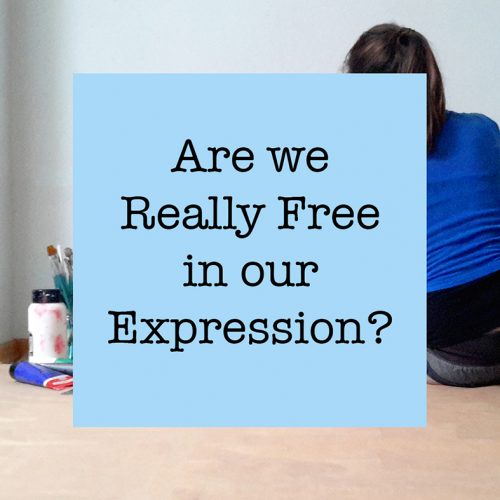When I put a blank canvas in front of two people, I get different reactions. One will say: wow, I can paint whatever I want! The other will say: oh boy, what should I paint now?!

The first response is typical for children, especially those who are still not a part of the school system. Those are free, they do as they feel, don’t bother with the right or wrong way, are not worried about the final outcome of the painting, how long it will take to finish it, what will they paint or how it will be perceived by others. When they finish the painting they will announce with the biggest excitement and self-confident: “Look at this! I’ve painted it!” and want to share this masterpiece with the whole world. Until someone tells them they shouldn’t, because it is actually not so good. If they get responses like: this is ugly, you should correct this, follow this rule, the flower must look like this, not like that, these kids will grow up into adults who ask: “What should I paint?!” followed by words like: “so it looks good, the teacher likes it, so I won’t be criticized, so it follows the rules”.
Those kinds of thinking patterns are not related only to art but also to all the others aspects of our life. Thoughts we hear from people who are close to us, from teachers, society, television, become our own thoughts and beliefs. If someone corrects what we do as a child all the time, we will feel like a person who can’t do anything right when we grow up. We don’t trust ourselves, our decisions, our truth, have low self-esteem and always living in a box of rules others have set for us and we don’t even agree with them.
We can understand the child, he wants to please his parents to get love, acceptance, attention, so he plays by their rules and ensures that his needs are met. We can also understand that our parents don’t want to suppress us, they’re just sure that their solution is the best one and because they want the best for us, they wish we follow their perception. It’s a pattern we keep and live as an adults to fit in, to get love, acceptance, safety, we do things as we are supposed to, follow ideas that seem good to the community, doubt in our own decisions, pick jobs that are perceived as respectable way of life that is acceptable for social norms, our common thought becomes “What will others think about it?”. We rarely ask ourselves what pleases us, what we really want to do at this moment, do we really want to go on this trip, or do we really like this profession, food, clothing, person, do we really like ourselves? And even less often we allow ourselves the freedom to live as we prefer.
Art expression is a great indicator of our way of thinking, which reveals those thought patterns. During the process of making an art piece you can observe, what kind of mind filter do you use to evaluate yourself and the art you’re making. This exercise can bring you the awareness of how you react in life in general: create an artwork from start to the end, write down the thoughts that arise along with the process and check how they affect your art and every other aspect of life – job, relationships, self-image, income, and other everyday situations.
Sharing with you some ideas from the Osho’s book about arts, that can give the old story some new perspective, they can be implemented to many areas of life (replace the word artist with a person):
- the artist can’t express himself and be reputable at the same time, the reputation is something that follows social norms and rarely a corresponds our own perception
- the artist doesn’t have time to criticize others, he is too busy with his own creative expression and allows others to express themselves in their own way as well
- your artworks will never be liked by everyone, maybe no one will like it, it’s important you like them
- the artist doesn’t have to defend his work or explain why he does something the way he does, it is important to know his “why” just for his own fulfilment
Would love to hear if this serves you and would like to read more of this type of content.
Read also: